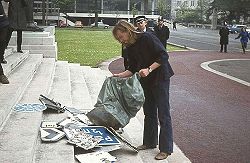- Cymdeithas yr Iaith Gymraeg
-
Cymdeithas yr Iaith Gymraeg, (English: The Welsh Language Society), often abbreviated to Cymdeithas or Cymdeithas yr Iaith is a pressure group in Wales campaigning for the future of the Welsh language. The current Chairperson of Cymdeithas yr Iaith Gymraeg is Bethan Williams of Eglwyswrw, Pembrokeshire.
Contents
History and background
The Society was established in name on 4 August 1962 at Pontarddulais in South Wales, but did not have a constitution until 18 May 1963. The formation was at least partly inspired by the annual BBC Wales Radio Lecture given on the 13 February 1962 by Saunders Lewis and entitled Tynged yr iaith (The fate of the language).[1]
The Society's first public protest took place in October 1962 at Pont Trefechan in Aberystwyth, where around seventy members and supporters held a 'sit-in' blocking road traffic for half an hour.[2]
The first campaigns were for official status for the language, with a call for Welsh-language tax returns, schools, electoral forms, post office signs, birth certificates and so on. This was done through the formation of 'cells', the first operating in Bangor in April 1963 by Owain Owain who also founded and edited the Society's only publication, Tafod y Ddraig ('The Dragon's Tongue') and designed the logo.
 Protestors dump English only road signs at the steps of the Welsh Office in Cathays Park, Cardiff. It started in 1970 and ended in 1972.
Protestors dump English only road signs at the steps of the Welsh Office in Cathays Park, Cardiff. It started in 1970 and ended in 1972.
Cymdeithas yr Iaith believes in non-violent direct action and in the course of their campaigns over a thousand people have appeared before the courts for their part in various campaigns, many receiving prison sentences, making it one of Britain's largest protest groups since the suffragettes - in terms of fines and the numbers sent to prison.[3][4] Typical actions include painting slogans on buildings owned by businesses, and other minor criminal damage. [5][6][7] At the beginning of the 1970s Cymdeithas began to campaign for a Welsh language radio and television service. Radio Cymru was established in 1977, but in 1979 the Conservative government announced in that it would not keep its election promise of the establishment of a separate Welsh language television channel. Some protesters refused to buy television licences and others climbed up television masts and invaded television studios.[8] S4C was finally launched in 1982.
Cymdeithas is a largely voluntary movement, which also employs two full-time members of staff at its head office in Aberystwyth, Ceredigion, one member in its Caernarfon office and one part-time member in the Llanfihangel ar Arth office.
Campaigns
Cymdeithas yr Iaith believes that Welsh is not at present the official language of Wales. The Welsh Language Act of 1993 declared that Welsh should be treated on an equal basis with English, but Cymdeithas yr Iaith argues that this falls short of what is needed, and that the lack of official status means that the Welsh language misses out on many crucial European grants. They are calling for Welsh and English to be declared official languages in Wales.
The principal campaigns can be divided into six major areas:
Cymru 2020 (Wales 2020)
This campaign hopes to "secure the future of the language" by 2020 and avoid what they claim could be a crisis where the language could be in decline.
Grŵp Deddf Iaith Newydd (New Welsh Language Act Group)
This campaign is involved in the demand for a new Welsh language act. The current Welsh language act does not include areas such as the private or voluntary sector, and Cymdeithas yr Iaith see these sectors as some of the principal areas of social communication in modern Wales.
Studio invasion, protests and continuing controversy
On July 24, 2004 (five weeks after launching), Radio Carmarthenshire's studios in Narberth were invaded by eleven activists from the Welsh language Society Cymdeithas yr Iaith Gymraeg. They were protesting about Radio Carmarthenshire's decision to limit the amount of Welsh Language programming broadcast on Radio Carmarthenshire.
The offices and studios were stormed during a live broadcasts, taking Radio Carmarthenshire and Pembrokeshire off air for 15 minutes. According to Keri Jones, his head of sales was injured, and needed hospital treatment for a fractured wrist during the scuffles which ensued. Police arrested eleven activists, and subsequently released them pending further enquiries. Keri Jones later branded the members of the group as "terrorists".
Cymdeithas claim that 50% of the population in Carmarthenshire speak Welsh as a first language, but less than 5% of Radio Carmarthenshire's output is in Welsh. As a result of complaints and pressure from the society and individuals, the United Kingdom's broadcasting watchdog Ofcom issued Radio Carmarthenshire with a 'yellow card' warning in late 2004 and any further claims of the station not conforming to its licence agreement will result in the station being severely reprimanded by Ofcom.
Grŵp Addysg (Education Group)
Welsh language medium education is available in most areas of Wales in the secondary and primary stage of school education. Welsh second-language GCSEs are compulsory in English medium education. This group demands improvements and also massive expansions in further (college) and higher (university) education. This mainly includes a Welsh language federal college, which is a multi-sited college that provides courses and resources in the medium of Welsh.
National Assembly
Cymdeithas are pressing for more politicians to use Welsh in the chamber of the National Assembly for Wales, where both Welsh and English are spoken.
See also
References
- ^ Davies, A History of Wales, Penguin, 1994, ISBN 0-14-014581-8, p 649: "the catalyst (for its formation) was the radio lecture given by Saunders Lewis on 13/2/62"
- ^ Dylan Philps. "history of the welsh language society" in The Welsh Language in the Twentieth Century. Ed. by G.H. Jenkins and M.W. Williams. Page 471
- ^ Dylan Phillips, 'Trwy ddulliau chwyldro..? Hanes Cymdeithas yr Iaith Gymraeg', Gomer, 1998, ISBN 1-85902-594-3 p 257
- ^ Clive Betts, 'Inside the Welsh Language Society', Western Mail, 5/7/1977
- ^ BBC News | WALES | Four charged after language rally
- ^ BBC News | WALES | Five arrested at language rally
- ^ Activist arrested over Tesco protest - Daily Post North Wales
- ^ Tynged yr Iaith, The Welsh Language Society, Broadcasting in Welsh, The Welsh Language Act on Ymgyrchu!, a website by the National Library of Wales
External links
- Cymdeithas yr Iaith website (Welsh)
- Cymdeithas yr Iaith website (English)
- Documents on the founding of the Society (English)
- New Welsh Language Act campaign (English)
- Ymgyrch Ddeddf Iaith Newydd (Welsh)
Categories:- Welsh nationalism
- Welsh language
- Political pressure groups of Wales
- Entities with Welsh names
Wikimedia Foundation. 2010.

